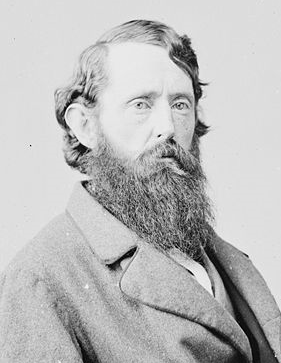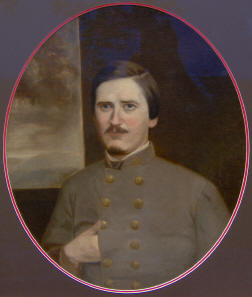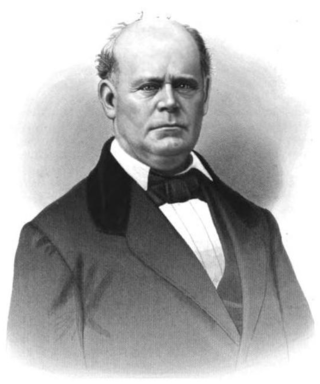Related Research Articles

Wendell Hampton Ford was an American politician from the Commonwealth of Kentucky. He served for twenty-four years in the U.S. Senate and was the 53rd Governor of Kentucky. He was the first person to be successively elected lieutenant governor, governor and United States senator in Kentucky history. The Senate Democratic whip from 1991 to 1999, he was considered the leader of the state's Democratic Party from his election to governor in 1971 until he retired from the Senate in 1999. At the time of his retirement, he was the longest-serving senator in Kentucky's history, a mark which was then surpassed by Mitch McConnell in 2009. He is the most recent Democrat to have served as a Senator from the state of Kentucky.

Benjamin Gratz Brown was an American politician. He was a U.S. Senator, the 20th Governor of Missouri, and the Liberal Republican and Democratic Party vice presidential candidate in the presidential election of 1872.
The 1948 Democratic National Convention was held at Philadelphia Convention Hall in Philadelphia, Pennsylvania, from July 12 to July 15, 1948, and resulted in the nominations of President Harry S. Truman for a full term and Senator Alben W. Barkley of Kentucky for vice president in the 1948 presidential election. One of the decisive factors in convening both major party conventions in Philadelphia that year was that the eastern Pennsylvania area was part of the newly developing broadcast television market. In 1947, TV stations in New York City, Washington and Philadelphia were connected by a coaxial cable. By the summer of 1948 two of the three new television networks, NBC and CBS, had the ability to telecast along the east coast live gavel-to-gavel coverage of both conventions. In television's early days, live broadcasts were not routinely recorded, but a few minutes of Kinescope film of the conventions has survived.

Frederick William Schule was an American track and field athlete, football player, athletic coach, teacher, bacteriologist, and engineer. He competed for the track and field teams at the University of Wisconsin from 1900 to 1901 and at the University of Michigan in 1904. He was also a member of the undefeated 1903 Michigan Wolverines football team that outscored its opponents 565 to 6.

Howard Sutherland was an American politician. He was a Republican who represented West Virginia in both houses of the United States Congress.

Charles Daniel Drake was a United States senator from Missouri and Chief Justice of the Court of Claims.
The Unionist Party, later known as the Unconditional Union Party in the border states, was a political party in the United States started after the Compromise of 1850 to define politicians who supported the Compromise. It was used primarily as a label by politicians who did not want to affiliate with the Republicans, or wished to win over anti-secession Democrats. Members included Southern Democrats who were loyal to the Union as well as elements of the old Whig Party and other factions opposed to a separate Southern Confederacy.
George A. Ellsworth (1843–1899), commonly known as "Lightning" Ellsworth, was a Canadian telegrapher who served in the cavalry forces of Brig. Gen. John Hunt Morgan in the Confederate Army during the American Civil War. His use of the telegraph to spread disinformation to the Union forces was declared by The Times as the greatest innovation to come out of the war.
Richard Aylett Buckner was a lawyer and farmer who served United States representative from Kentucky as well as Surveyor-General of Kentucky and Kentucky judge of the 18th judicial district. He may be best known as the father of Aylette Buckner who also served a Representative from Kentucky, or as the eldest of three American judges of the same name. Another of the judges was his son Richard Aylett Buckner (1810-1900), who helped keep Kentucky in the Union, or his grandson Richard Aylett Buckner (1849-) who became an Arkensas state senator.

Lyne Shackelford Metcalfe was a U.S. Representative from Missouri. Born in Madisonville, Kentucky, Metcalfe attended the common schools, Shurtleff College, Alton, Illinois, and Illinois College, Jacksonville, Illinois. He engaged in mercantile pursuits in Alton, Illinois, in 1844. He served as member of the board of aldermen of Alton.

The Veiled Prophet Parade and Ball was a yearly civic celebration in St. Louis, Missouri, over which a mythical figure called the Veiled Prophet presided. The first events were in 1878.

Rice Evan Graves, Jr. was an artillery officer in the Confederate States Army during the American Civil War. He was killed in the Battle of Chickamauga.
Rick Stream is an American, former budget/project manager for the United States Department of Defense and a Republican member of the Missouri House of Representatives. He has represented the 90th district, which includes parts of St. Louis County, since 2013 and currently serves as chairman of the budget committee. Prior to redistricting he represented the 94th district from 2007 to 2013.

John W. Wheeler was the editor of the St. Louis Palladium, a black-oriented newspaper printed in St. Louis, Missouri, from about 1884 until about 1911.

Alonzo William Slayback (1838–1882), a lawyer, was an officer in the Confederate Army and a founder of the Veiled Prophet Parade and Ball in St. Louis, Missouri. He was shot and killed in self-defense by the managing editor of the St. Louis Post-Dispatch.

William Elisha Hyde (1836-1898) was an American journalist, the managing editor of the Missouri Republican newspaper of St. Louis, Missouri, for nineteen years.

Nathaniel Paschall (1802–1866) was an American journalist, the editor of the Missouri Republican.
The Missouri Republican was a newspaper founded in 1808 and headquartered in St. Louis, Missouri. Its predecessor was the Morning Gazette. It later changed its name to St. Louis Republic.
Joseph A. Dacus (1838–1885) was an American writer and journalist who wrote a history of outlaws Frank and Jesse James and a survey of the 1877 St. Louis general strike. He was also a member of the Missouri State Legislature.

Charles G. Ramsey was a newspaper publisher who came to St. Louis, Missouri, in 1836 and in 1840 established the city's first daily newspaper, the New Era, with Nathaniel Paschall and published it for about ten years.
References
- ↑ Kentucky, County Marriage Records
- ↑ "Family Reunion," The Examiner, Owensboro, Kentucky, July 13, 1877, image 5
- 1 2 1850 census
- 1 2 3 4 "When Lincoln and Douglas Debated," The Courier-Journal, Louisville, Kentucky, image 77
- ↑ Bone, Winstead Paine (1935). A History of Cumberland University 1842-1935. pp. 99–100.
- 1 2 3 4 5 Betty Johnson Douglas, "'Front Page Stuff' of the 50s and 60s Recalled by a Veteran Editor," The St. Louis Globe-Democrat Magazine, March 6, 1927, image 74
- ↑ 1880 U.S. Census
- ↑ 1910 U.S. Census
- ↑ "Old Folks Home Resident Is 101 Years of Age," Webster News-Times, Webster Groves, Missouri, January 31, 1930, page 1
- ↑ "Daniel M. Grissom, Ex-Editor, 101, Dies," St. Louis Post-Dispatch, May 18, 1930
- ↑ "Grissom Services to Be Held Today," St. Louis Daily Globe-Democrat, May 19, 1930, image 2
- ↑ St. Louis Democrat, cited in "Release of the Proprietor and Editor of the Evening News," Morning Louisville Democrat, September 27, 1861, Page 4
- ↑ "From Jefferson City," Daily Missouri Republican, December 5, 1863, page 3
- ↑ "Election of Public Printer in Missouri," Chicago Tribune, December 6, 1863, image 1
- ↑ 1865 St. Louis City Directory, page 169
- ↑ 1878 St. Louis City Directory, page 375
- ↑ 1880 St. Louis City Directory
- ↑ "St. Louis, The Fourth City, 1764-1911," page 171]
- ↑ "Mr. Hyde on Journalism," St. Louis Daily Globe-Democrat, January 10, 1896, image 9
- ↑ Täglicher des Westens, September 19, 1862, image 3, column 3
- 1 2 History of St. Louis
- ↑ "Our National River," St. Louis Republic, February 21, 1892, page 15
- ↑ "Daniel Grissom, 97, Recalls His Early Days Here," The Messenger, Owensboro, Kentucky, May 29, 1927